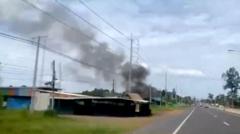Recent border skirmishes between Thailand and Cambodia have reignited historical tensions, fueled by political missteps and personal betrayals. As fatal conflicts emerge, both nations grapple with the consequences of deteriorating relations rooted in past alliances and ongoing economic struggles.
Tensions Rise Along the Thailand-Cambodia Border Amid Political Fallout

Tensions Rise Along the Thailand-Cambodia Border Amid Political Fallout
A tense standoff between Thailand and Cambodia escalates as a once-close political relationship unravels, resulting in deadly border clashes and diplomatic strain.
The tranquility along the Thailand-Cambodia border has been shattered, as renewed hostilities between the two nations result in significant casualties and diplomatic upheaval. Recent altercations can be traced back to longstanding territorial disputes, but the current flare-up is intensified by a fractured political relationship between the two countries' leadership.
Cambodia and Thailand, with their shared forested border, have experienced sporadic violence in the past, prominently in 2008 and 2011, which resulted in the loss of 40 lives. Although conflicts have historically been de-escalated quickly, the current situation differs significantly. On Thursday, at least 15 civilians were confirmed dead from the recent hostilities, alongside casualties reported on both sides.
The current unrest was ignited after an explosion injured five Thai soldiers due to a landmine, causing tensions previously managed through military dialogue to resurface violently. In an unexpected twist, relations worsened last month when Cambodian leader Hun Sen leaked a phone conversation with Thai Prime Minister Paetongtarn Shinawatra, leading to a significant political fallout. In this conversation, she expressed familiarity with Hun Sen by addressing him as "uncle," which drew both public ridicule and severe backlash.
This incident resulted in Paetongtarn's suspension and has raised questions about the motivations behind Hun Sen's betrayal of their long-standing relationship, one rooted in familial ties dating back decades. Critics assert that Paetongtarn misjudged her affinity with Hun Sen, believing that leveraging familial connections could foster diplomatic resolution. The fallout has not just been rhetorical; it has prompted real investigations into Cambodian business figures linked to illicit activities.
As both Thailand and Cambodia grapple with challenging economic conditions, heightened nationalism appears to be fuelling the conflict. Hun Sen's sharp rhetoric against Thailand, coupled with allegations of secret documents that could implicate Thaksin Shinawatra, compounds the tensions. Thailand retaliated by expelling Cambodia's ambassador and recalling its own diplomatic personnel, escalating an already volatile situation.
Both countries are now at a crossroads, with a lack of strong leadership threatening to push the conflict further. Though some analysts speculate that the experienced political figures in both nations could eventually mediate a resolution, the current environment underscores an urgent need for intervention, potentially from the Association of Southeast Asian Nations (ASEAN).
With Thailand's economy stagnating under looming US tariffs, and Cambodia struggling to recover from the pandemic, both nations face a delicate balancing act. A successful de-escalation of this conflict may hinge not only on repairing personal relationships between leaders but also on broader regional diplomacy to restore stability. The motivations behind Hun Sen's recent maneuvers remain uncertain, yet they signal a critical juncture in Southeast Asian politics and have ignited a dangerous spiral of confrontation that must be addressed for peace to prevail.


















